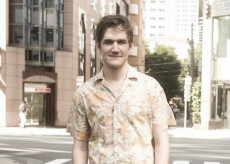『エイス・グレード 世界でいちばんクールな私へ』 ボー・バーナム監督来日インタビュー/Interview with Bo Burnham about “Eighth Grade”
NeoL / 2019年9月19日 21時15分
『エイス・グレード』とは8年生、つまりは中学2年生のこと。アメリカでは多くの中学校が8年生で修了となり、9年生からは高校に進学する。『レディ・バード』の製作陣と気鋭のスタジオ「A24」が手がけた本作は、元YouTuberで人気コメディアンのボー・バーナムの監督デビュー作。大人しくて目立たない主人公ケイラの中学校生活最後の一週間を描いた物語だ。動画の中で理想の自分を演じ、SNSで友だちとつながろうと必死な彼女の姿を通して、いつの時代も共通する思春期のもどかしさはもちろん、生まれたときからインターネットが当然のように存在し、SNSと共に生きる“ジェネレーションZ”の葛藤がリアルに浮かび上がる。自ら脚本も担当した監督にインタビューを行い、8年生の物語を書いた理由や、2018年の最多新人映画賞を獲得した主演のエルシー・フィッシャーとの撮影秘話などを聞いた。(→ in English)
――日本には“中二病”という言葉があるのですが、13歳というのは難しい年齢ですよね。私自身もその頃の記憶はぼんやりしていて、必ずしも思い出したい時期ではありません。監督はなぜ8年生(日本の中学2年生にあたる学年)の物語を描こうと思ったのですか?
ボー・バーナム監督「まさにそれが理由です。アメリカには高校生活や高校生についての映画がたくさんあるのですが、それはみんなが思い出したい時代だからです。17歳に戻りたくない人なんていませんよね。僕はかねてから、13歳についての映画が少ないと感じていました。僕にとっても、最も感情的であまり喜ばしくない記憶はその時期のことです。あの頃のような経験を忠実に描けたら、自分好みの実験的な映画ができるのではないかと思いました」
――主人公を女の子にしたのはなぜですか?
ボー・バーナム監督「主人公を女の子にしたのは、自分の思い出のような作品にしたくなかったからです。若者についての映画は、その多くが監督や脚本家の回想のように感じられます。もちろん僕はそういう物語も好きですし、素晴らしい作品もありますが、記憶と現実は異なると思うんです。人間は良いことだけを記憶しがちですから。大人になるといろんな問題を抱えて、『あーあ、税金や家賃の心配をしなくていい13歳に戻りたいよ』などと思ってしまいますが、実際に13歳の頃はそんな風に思わなかったですよね」
――本作はドラマチック過ぎないところもいいなと思いました。多くの学園映画では主人公がいじめに遭ったりしますが、ケイラはいじめられているわけではなく、ただ単に目立たない女の子です。母親はいないけれど、彼女の悩みは必ずしも母親の不在が原因ではありません。
ボー・バーナム監督「そう言っていただけてすごくうれしいです。『ハリー・ポッター』のような若者が描かれた映画の多くは、ものすごくドラマチックですよね。ファンタジー映画と捉えられていますが、僕はそうは思いません。子どもたちには現実的に感じられるのです。なぜなら、学校でかっこいい男の子に話しかけるということは、ドラゴンを倒すのと同じくらい勇気の要ることだから。そこで僕は、平凡な人生を題材にして、子どもたちが自分の人生と同じくらいドラマチックに感じられる映画を作りたいと思いました。たとえわかりやすいドラマが展開しなくても、彼らにとって人生はドラマチックなのです」
――13歳の女の子の気持ちをこんなにも的確に描けたのはなぜですか?
ボー・バーナム監督「本作の脚本を書くにあたって、まずはネット上に子どもたちがアップした動画を観ることから始めました。彼らの発言を書き起こしていったのですが、一語一句というよりも不完全でぎこちない話し方を重視して、言葉の響きを拾っていきました。若い主人公が出てくる映画を観ていると、すごく雄弁に語っていることが多いんです。まるで脚本家がしゃべっているように聞こえるんですよね」
――確かにそうですね。
ボー・バーナム監督「僕にとって最も興味深かったのは、若さには失敗がつきものだということです。彼らはうまく話そうとするけれど話せないし、かっこよく服を着こなそうとするけれどできません。映画は脚本家や衣装デザイナー、美術デザイナーなどによって作られるので、すべては絶妙にデザインされています。でも子どもには、自分の人生をデザインすることなどできません。脚本で苦労したのは、うまく話せない人物をどうやって書くかということでした。不明瞭な人を明瞭に書くにはどうしたらいいだろう、と考えたのです。脚本に加えて演出面でも工夫して、役者たちには本作において最悪なのは完璧な演技だと話しました。しゃっくりをしても、咳をしても、言葉が抜けてもいいのです。劇中のケイラは映画に出てくる女の子たちのようになりたくて悩んでいるわけですから。彼女は映画で観た人たちのように話したいと思っているのです」

――主人公のケイラを演じたエルシー・フィッシャーは、ゴールデン・グローブ賞にもノミネートされたそうですね。完璧にぎこちない演技が素晴らしかったです。どうやって彼女のことを見つけたのですか?
ボー・バーナム監督「ネットで彼女の動画を見つけてインタビューしました。オーディションに来た他の子たちは、普通に会話をしているときはちょっとぎこちなくて完璧なのに、演技に入るとなんだか不自然なモードに入ってしまうのです。おかしなことですが、子どもたちは子どもらしく演じるように教えられているんですよね」
――子役スターのような感じですか?
ボー・バーナム監督「まさにそうでした。彼らは自由奔放な子どもらしさをすべて押し殺すように教えられています。でも実際に13歳の子どもと話すと、大人を相手にすごく緊張しているので、彼らの言うことはぎこちないのです。そのようなエネルギーやぎこちなさを保ちつつシーンに反映できるのは、エルシーだけでした。彼女はどんなシーンでも無骨に演じられます。役者としてそれは難しいことだと思います。自分に近い役を演じるのはとても難しいのです。カウボーイハットをかぶって役になりきるほうがずっと楽なんですよね」
――特にあの年頃の子は、自分自身を見せたくないですよね。
ボー・バーナム監督「そうなんです。脚本ではケイラはシャイな女の子として書かれているので、それも演技の一部になりました。他の子たちはオーディションでシャイなふりをしていたのですが、本当にシャイな人は自信があるふりをするはずなんですよね。シャイな子はシャイだと思われたくないはずです。エルシーはそこを理解していました。実はこれは『障害は演じるな』という昔ながらの演技方法です。エルシーはすべてのシーンでそれをちゃんと理解していて、クールなふりをしました。すべてうまくやりこなせているようなふりをしたのです」
――劇中のケイラと父親の関係もとてもリアルでした。ディナーのシーンでは、父親に話しかけられたケイラが本当に鬱陶しそうで、あの年頃の自分を思い出してちょっと親に悪かったなと思ってしまいました(笑)。
ボー・バーナム監督「父親役のジュシュ・ハミルトンは、ケイラ役のエルシーが一緒にリハーサルした唯一の役者です。他のシーンはケイラにとって初めての状況を描いているため、あえて他の子どもたちとはリハーサルさせませんでした。ディナーのシーンでは、エルシーにジョシュのことを本当にうざいと感じてほしかったので、1000回くらい撮影しました(笑)。あのシーンを観て親に悪かったなと思ったとのことですが、それが親の役目なんだと思います。あの年頃の子どもを持つ親はサンドバッグになる必要があります。ケイラは学校では誰にも声を上げられないので、(父親に反抗することは)実は健全なことなのです。彼女は父親に『うるさい』と言っていますが、実は自分の周りのすべての人に『うるさい』と言いたいのです」
――本作を観た人の多くは、13歳の頃にSNSがなくてよかった…と思うのではないでしょうか。映画はインターネットそのものよりも不安な気持ちにフォーカスしていますが、ケイラの生活においてインターネットの存在は大きいですよね。
ボー・バーナム監督「僕は自分が抱いていた不安を、25歳の頃に受け止めることができました。そして、自分の不安がインターネットと関係していることに気づいたのです。インターネットは助けにはなっていませんでした。さらに、それこそが新世代の若者たちが抱える問題なのではないかと感じました。彼らはとても不安を感じていて、インターネットは何の役にも立っていないのです。最も興味があったのは、インターネットが不安に結びついているという点でした。なぜなら、不安というのは自分の頭の中に閉じ込められた状態だからです。インターネットは唯一無二のものですが、僕らを一つにすることもできるし、完全に孤独にすることもできる、奇妙なものです」
――自分の考えの中に閉じ込められてしまうわけですね。
ボー・バーナム監督「そうです。そして、自分だけが自分を偽っていて、ネット上の他のみんなはうまくやっているのだと感じてしまう。みんながお互いに対してそのように感じてしまうのです。でも、僕は決して論文を書こうとしたわけではありません。僕はただ、不安を感じることについて書きたかった。そして、不安は僕を13歳のような気分にさせました。それがこの物語を手がけることになった理由だと思います」
――共感できる人は多いと思います。ケイラがスマホのアラームで目を覚ましたり、寝る前にベッドの中でSNSをチェックしたりする姿を見て、自分も13歳の彼女と変わらないなと思いました。
ボー・バーナム監督「そうなんですよね。スマホについて子どもに説教をしている大人がいると、『でも、あなたも同じなのでは?』と思うんです。僕だってケイラと何も変わりません。インターネットとどうやって共存していくべきか、まったく答えが見つかっていないのです。ネット上では誰もが13歳のように振る舞っている気がします。つまり、実は年相応に振る舞っているのは13歳の子どもたちだけなのです。多分インターネットを最もよく理解しているのは彼らでしょう。『これは子どもたちだけの問題だ』と一蹴するのではなく、観客の皆さんがケイラの経験の中に自分自身を見出してくれたらうれしいです」

――ケイラが年上の男子高生と車の中で二人きりになるシーンが印象的でした。特に何か起こらなくても、違和感を覚えたり、自分が間違ったことをした気分になったりという状況です。あのシーンに込めた思いは?
ボー・バーナム監督「脚本を執筆中にあのような場面が浮かぶと、何が起きているかに耳を傾けて、責任を持って書くようにしています。あのシーンでは、自分にとって親近感のあるタイプの男を書こうとしたのだと思います。映画に登場する肉食男子には、わかりやすい大柄でマッチョなタイプが多いかもしれません。でも、繊細でおとなしくて知的な男の子が、相手のことを理解できるからこそ利用する場合もあって、それはあまり語られていないと思うんです」
――相手をコントロールするわけですね。
ボー・バーナム監督「まさにそうです。気の合う相手が、それを利用することもあるのです」
――そういう状況に直面したことのある女の子は多いと思います。
ボー・バーナム監督「そうですよね。そして、それは見た目よりもわかりにくいんです。あのシーンで重要だったのは、ああいった状況がいかに厄介でグレーなのかを描くことでした。でも現場ではエルシーが不快な思いをしないよう、きめ細かくコミュニケーションを取りながら撮影しました。アメリカでは頻繁に話題に上がったのですが、あのシーンから半年後に『何があったの?』と聞かれたら、ケイラは『何もなかった、大したことなかった』と答えるでしょう。でも実際にその場にいると、たとえ暴力的な被害がなくても、精神的に侵害される場合もあるのだと気づくはずです。それは男の子には理解のできないことです。僕もあの年頃では理解できませんでした。特に男の子は、言葉だけで女の子の自由や客観性を侵害しかねないのです。書類上では性的暴行として認められないことでも、ひどいトラウマになりかねません」
――日本の観客には本作からどのようなことを感じ取ってほしいですか?
ボー・バーナム監督「僕はただ何かを感じてほしいと思っています。どのように考えてもらっても構いません。とにかくケイラの気持ちを感じて、彼女の中に自分を見出してもらえたらうれしいです。それに、この映画が会話のきっかけとなることを願っています。映画自体は会話ではありません。映画が何かの参考になってくれることを願っています」
――これからも監督業は続けますか? 今後の予定は?
ボー・バーナム監督「はい。今は新作を企画しているところです。もう少し明確にインターネットをテーマにした作品にしたいと思っていますが、まだどうなるかはわかりません」
photography Yudai Kusano
text Nao Machida
edit Ryoko Kuwahara
『エイス・グレード 世界でいちばんクールな私へ』
9月20日(金)ヒューマントラストシネマ有楽町、シネクイント渋谷ほか全国順次ロードショー
HP: http://www.transformer.co.jp/m/eighthgrade
監督・脚本:ボー・バーナム『ビッグ・シック ぼくたちの大いなる目ざめ』(出演)
出演:エルシー・フィッシャー(『怪盗グルーのミニオン危機一発』※声)、ジョシュ・ハミルトン『マンチェスター・バイ・ザ・シー』、エミリー・ロビンソン『バッド・ウィエイヴ』、ジェイク・ライアン『ブルー・ワールド・オーダー』ほか
製作:A24/音楽:アンナ・メレディス
【2018年/アメリカ/英語/93分/原題:EIGHTH GRADE/G/日本語字幕:石田泰子】
配給:トランスフォーマー
© 2018 A24 DISTRIBUTION, LLC
(This interview is available in English)

――I guess it’s universal that being 13 is not easy, and there is even a term called “eighth-grader syndrome” in Japan. My memory of eighth grade is blurry probably because it's not necessarily the time in my life that I want to remember. Why did you decide to tell a story about an eighth grader?
Bo Burnham: That really is it. In America, there are so many movies about high school and that age because everyone wants to remember that time. Who wouldn’t want to be 17 again? I always felt like there were just not a lot of movies about being 13. For me, my most visceral memories, not the pleasant ones, were from that time. If you made a movie that really was true to that experience, it would be a very experiential movie, which is a kind of movies I like.
――Why did you make it a story about a girl?
Bo Burnham: The choice for it to be a girl really was I didn't want it to feel like a memory. A lot of movies about being young feel like memories, it feels like the memory of the director or the memory of the writer. And I like those stories, that can be great, but I don't think memory is the same as what it is. We tend to remember just the good parts. We think about all of our adult problems and go, "Oh, I would love to be 13 again and not have to worry about taxes or rent." But the truth is you didn't feel that way that time.
――I like the fact that this movie is not too dramatic. Kayla is not bullied, but she's just overlooked. And her mom is not around, but it's not that every problem she has stems from that absence.
Bo Burnham: It's really nice you said that because there are a lot of movies about young people like "Harry Potter" or something that are super dramatic. People think of them as fantasy movies, but I don't think they are. To kids, it feels realistic. Because walking across the hall to talk to the cute boy feels like you are going to slay the dragon or something. But the idea was, can you make a movie that feels as dramatic as life does to kids with just a normal life? Because life feels dramatic to kids even when it doesn't have explicit drama in it.
――How did you find the voice of a 13-year old so amazingly?
Bo Burnham: The initial part of writing the movie was just going online watching these videos that kids would make. And I would transcribe them, not just word for word, but sound for sound, like capture that weird way they spoke, which was imperfect and clumsy. Because so many movies I've seen with young protagonists, they spoke so eloquently. They suspiciously spoke like a screenwriter spoke, you know?
――That is so true.
Bo Burnham: And what I was most interested in was, being young is failure, you are trying to speak well and you can’t. You are trying to dress well and you can't. And sometimes movies, because they are made by writers and costume designers and production designers, everything is designed well. But a kid doesn't know how to design their life. So the struggle of it was, how do you write someone who themselves isn't a great writer? How do you articulate someone that's inarticulate? So part of that was writing, but also was what I was working with actors, telling them that the worst thing they can do is do this perfectly. If you hick up, if you cough, if you miss a word, that's good. Because part of her struggle in the movie is, she wishes she were like the girls in the movie. She wishes she sounded like all the people in movies she'd seen.

――Elsie Fisher who played Kayla was so great and she was even nominated for Golden Globe Award. I thought she was so perfectly awkward. How did you find her?
Bo Burnham: I found a clip of her online and interviewed. Every other kid that would come in to audition, they would sit down with me and we have a conversation like this, and they would be perfect when I talked to them. They would be a little awkward. But when they acted, they would snap into this very affected, you know... because it's so weird the kids' had been taught to act like kids.
――Like child stars?
Bo Burnham: Exactly. And they are told to suppress everything about themselves that makes them a kid, which is they are spontaneous. If you ever talk to any 13-year olds, everything they say to you is so high-stakes because they are really nervous talking to an adult. Elsie was just the only person that was able to keep all of the energy and messiness and translate it into a scene. I can give her a scene and she could be unpolished. And I think that's a very hard thing to do as an actor. It's very hard to play someone that's similar to yourself. It's very easy to put on a cowboy hat and pretend to be a character.
――Especially at that age because you don't want to be yourself.
Bo Burnham: Exactly! And that's even part of the performance because in the script she is shy. So every kid would come in, they would pretend to be shy. But the thing is being shy is actually pretending to be confident. A shy kid never wants to look shy. And that's what she understood. Actually, it's a classic actor thing. They always say with actors, “Don't play the obstacle.” And Elsie understood that in every scene to try to be cool. Try to appear like you have it all together.
――The relationship between Kayla and her dad seemed so real. When I saw how annoyed Kayla was in the dinner scene, I felt bad for my parents because I so remember that [laughs.]
Bo Burnham: That was the only two actors that we rehearsed with. Everyone else I wanted it to be new, so I didn't have her rehearse with any of the kids. Because those were all new situations she was in. We ran that scene at the dinner 1000 times because Elsie had to be so tired of him [laughs.] But the thing is that as much as you would feel bad for the way you were with your parent, I think that is the job of a parent. Your job at that age is to be a punching bag. It's actually healthy for her, because when she's at school, she can't raise her voice to anybody. So when she's saying shut up to him, she's actually saying shut up to everyone in their life.
――I'm sure a lot of people would watch this movie and goes, “I’m so glad we didn’t have social media when I was 13!” Although the movie is actually more focused on anxiety, the Internet is a big part of Kayla's life. How did you want to incorporate the Internet into this story?
Bo Burnham: I was struggling with my anxiety, and I was sort of coming to terms with it at 25, when I had it very late in life. I just sensed that my anxiety was connected to the Internet somehow. It was just not helping. And I felt like that was the problem for this new generation. They were very anxious and the Internet was not helping them with that. So what I was most interested in was the way the Internet interfaces with our anxiety, because anxiety is just all about being in your head and trapped in your head. And the Internet is very singular, but it does a weird thing where it connects all of us but also completely isolates us.
――Like you go into your head.
Bo Burnham: Yeah. And you have the sense that I'm the only one faking it, and everyone else on the Internet has their shit together, and everyone mutually feels that way. But it wasn't me trying to write an essay. It was just a feeling I wanted to write about being anxious, and my anxiety made me feel like a 13-year old. So that is why I probably went with this story.
――I think a lot of people can relate to that. When I saw how Kayla waking up to an alarm set on her smart phone or scrolling through social media before she goes to sleep, I realized I’m just like her.
Bo Burnham: That's the thing, too. When everyone preaches about their kids and their phone, it's like, “Well, aren't you the same?” I don't feel any better than her. I definitely don't feel like I figured out how to live the Internet at all. And part of it felt like everyone on the Internet is acting 13. So 13-year olds are actually the only ones acting their own age. They are probably the ones that get it the most. I hope everyone can sort of see themselves in her experience, and not just think, “Oh, this is just a problem affecting kids.”

――The scene where Elsie is alone in a car with an older high school boy struck a chord with me. Nothing actually happens, but you feel something is not right, or you did something wrong. What were your thoughts on that scene?
Bo Burnham: It's just in writing this sort of thing started to happen and you just listen to what's happening, you try to be responsible with it. And part of that scene was trying to portray a certain type of guy I could relate to. You know the way that sort of predatory boys are often portrayed in movies. They are very obviously predatory, like big macho guys. But something I don't think is talked about enough is that sometimes the sensitive quiet boy who is pretty intelligent can be the one that takes advantage of you, because they understand you.
――They manipulate you.
Bo Burnham: Exactly. The one that you connect with can use that against you.
――I think a lot of girls have been in that situation.
Bo Burnham: Yes. And it's more subtle than it appears. That's what was important about that scene to show that how messy and gray it can sort of feel. But the scene itself had to be treated very sensitively and communicated with Elsie to make sure she was comfortable. Not much even happens in the scene, and this has been definitely a conversation that's been happening in the states a lot, is like, you can imagine six months after that, someone says "what happened?" to her. And she tells them what went on and goes, ”Nothing happened, it wasn't a big deal.” But when you were actually there, you can realize that something violent doesn't need to happen for it to feel incredibly violated. That's something definitely boys don't understand. I didn't understand it at that age. But you can really violate someone, and particularly a boy can really violate girl's sense of freedom and sense of objectivity and all that just verbally. Something that might not qualify as sexual assault on paper can be nevertheless incredibly traumatic.
――What would you want the Japanese audience to take home with when they leave the theater?
Bo Burnham: I just want people to feel things. They can think what they want. I hope they just feel for her and maybe see themselves in her. And the movie is hopefully going to spark conversations because it meant to have conversations. The movie itself isn't the conversation. The movie hopefully just gives you a reference for something.
――Are you going to keep directing? What’s next for you?
Bo Burnham: Yeah, I'm working on something now. I want to do something little more explicit about the Internet, but who knows?
photography Yudai Kusano
text Nao Machida
edit Ryoko Kuwahara
関連記事のまとめはこちら
https://www.neol.jp/movie-2/
この記事に関連するニュース
-
「自分にとって何が大切なのかを知ることができた」Jamie xx “In Waves”インタビュー
NeoL / 2024年9月16日 17時0分
-
Message from Anna Umemiya: “I began treatment for breast cancer on July 31.”
OTONA SALONE / 2024年9月4日 16時30分
-
イーロン・マスク氏、「Xアルゴリズム」明かす 「最も強力な指標のひとつは...」
J-CASTニュース / 2024年9月3日 19時17分
-
面接対策から日常会話まで、「日本語のオンラインプライベートレッスン」9月生・10月生の募集を開始!
PR TIMES / 2024年8月31日 10時40分
-
【ミスミ】機械部品調達のAIプラットフォーム「meviy」/ ハンドクレーン業界シェアNo.1のアイコクアルファがmeviyを採用
PR TIMES / 2024年8月30日 13時15分
ランキング
-
1本当に実写? 再現度がヤバすぎたキャラに「すべて完璧」「あまりに自然」
マグミクス / 2024年9月24日 21時25分
-
2WHOが注意を呼びかける「エムポックス」とは?治療薬はあるのか【薬学部教授が解説】
オールアバウト / 2024年9月24日 20時45分
-
3土井善晴氏が味噌汁に入れた“意外なモノ”に驚き 「めちゃめちゃおいしい」
Sirabee / 2024年9月24日 5時0分
-
4高齢者向け風俗は「心のふれあい重視」。家事、入浴…“レンタル奥さん”に高まる需要
日刊SPA! / 2024年9月24日 15時54分
-
5「カレー」調理時、“具”が物足りない…追加するとお勧めの“食材” JA全農が紹介
オトナンサー / 2024年9月24日 22時10分
記事ミッション中・・・
記事にリアクションする
![]()
記事ミッション中・・・
記事にリアクションする

エラーが発生しました
ページを再読み込みして
ください










